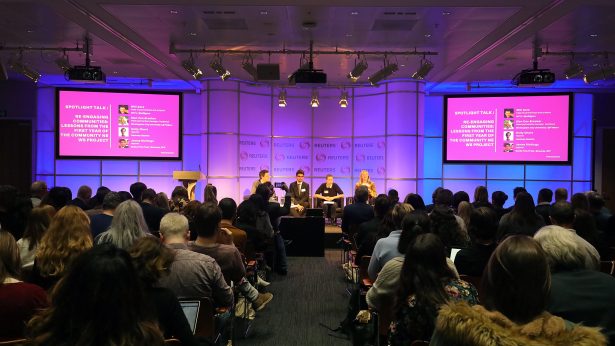There are no bigger subjects in online news media now than the fundamental question of whether readers will pay for content they’ve previously enjoyed for free. A breakout session at our news:rewired conference is tackling the issue head on, with panelists concluding that users will pay for content if it’s relevant and good enough.
One man that hopes people will pay for news is Tom Whitwell, assistant editor and head of online at the Times, who has been at the centre of his employer’s plans to re-write the online consumer news playbook. He said he’s well aware of the “the challenge of what we’re doing…” and he sheds some light on the thought process in starting the project:
Eighteen months ago we were at a fork in the road: the free option looked a lot less appealing than we thought it would. We were getting 22 million users a month and were making a significant amount of money, though not enough.
We then looked at what we could do to get to 30 or 40 million… We looked at how people were piling high four or five different versions of their stories to get to the top of Google. We saw that some people had a different agenda online than they did in print and ended up getting far away from their brand.

Whitwell continues: “We looked at some of the commercial [solutions], and one option was enormously intrusive advertising. For a lot of sites the barrier between journalism and commercial was getting very thin.”
The Times paywall itself isn’t live yet – users only have to register to gain access at the moment and payment is coming in the “next few weeks” – but Whitwell says the number of people registering is “very encouraging”. Commenters have made the jump from Times Online to thetimes.co.uk, Whitwell says, and he promises “a lot of things coming to the site in the next three or four months” in terms of personalisation.
He told me after the session (listen to the first audio interview below): “There’s a slice of functionality coming that will make for a much more personal experience for people.”
Whitwell won’t put a figure on the amount of money News International expects or hopes to make from the Times paywall project, but he puts it in perspective: “If we had believed that all of our free customers will transfer to paid customers, we would make £2 billion. We’re not expecting to make £2 billion.”
I caught up with Whitwell to ask what it had been like to work on the project and to find about about the personalisation features he says are on the way…
And here’s an audio clip of Whitwell’s talk:
Karl Schneider, head of editorial development at RBI warned delegates against letting the recession determine future digital strategy:
You have to careful about the point in the economic cycle – the way things are going now are not a fair reflection of the way things will be in five years’ time.
Personally I’m very optimistic about content supported by online advertising or advertising-like services. More than half our revenue comes from paid [for] content.

Now here’s a niche: Schneider showed slides of “polycarbonate pricing reports” – with comprehensive datapoints that are presumably very useful to people who understand them – from RBI’s chemical industry news brand ICIS
Bur what specifically makes people pay? The perceived value of content; the availability of free alternative and whether other people in the same industry use it. And here’s Schneider’s run-down of the things RBI can and does charge for:
— Data: “Accurate, up-to-date, good quality data, you can absolutely charge for.”
— News: “We are still charging for news, but it’s news you can use. It’s news you can read and act upon it.”
— Workflow tools: “You package up what your journalists do in a different way… turn research into a model policy that customers can pick up use themselves.”

